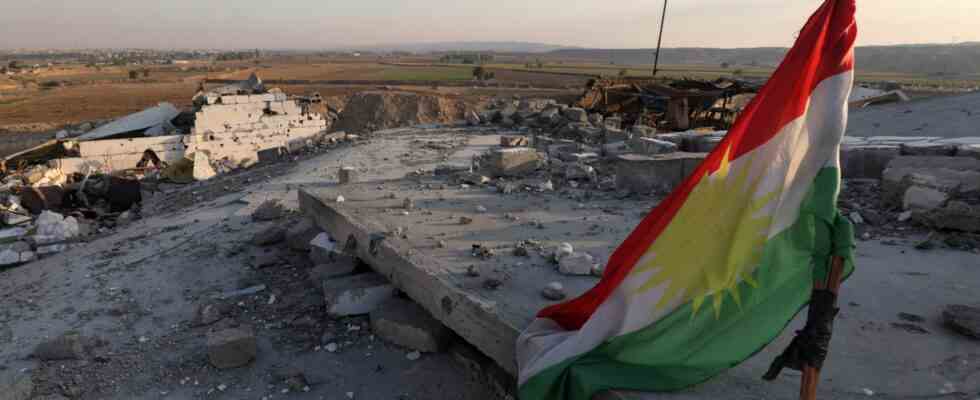interview
Status: 11/25/2022 10:41 am
The protests in Iran are particularly large in the Kurdish areas – and the regime is taking particularly brutal action against them. The Kurdish expert Matin explains why other Iranians are now showing solidarity with the Kurds.
ARD: Protests against the regime have been going on in Iran for ten weeks now. Resistance is particularly strong in the Kurdish areas of Iran. What are the reasons?
Kamran Matin: The history of Kurdish resistance to the Islamic Republic dates back to the founding of the new regime in the 1979 revolution. The Kurdish parts of Iran were then dominated by secular, socialist forces rather than Islamist forces that were dominant in the other parts of Iran. It took two or three years before the new government was actually able to drive the Kurdish forces out of the cities.
To person
Kamran Matin is Assistant Professor of International Relations at the University of Sussex in England. He is of Iranian origin Kurd.
There is a national movement among the Kurds, and there is something similar among other minorities in the country. But it is particularly pronounced among the Kurds because it is transnational. There are also Kurds in Iraq, Syria and Turkey. And what is happening there has a direct impact on the Kurds in Iran and vice versa. Politically, Kurdistan is also very well organized: There are many political groups and organizations and a high level of political awareness.
Last but not least, the slogan “Women, Life, Freedom”, the motto of the current protests, comes from the Kurds. And since they are very active at the forefront of the protests, that’s also why the government in the Kurdish areas has been using the most violence — not just in the last two months, but basically since the 1979 Islamic revolution.
“As if a foreign army had invaded”
ARD: You mentioned violence against demonstrators. Compared to those in cities like Tehran or Isfahan, it seems to be even more brutal. What information do you have about it?
Matine: The government deploys army and Revolutionary Guard forces there. There are helicopters circling over the cities. The internet is down, the power is down. There are pictures of people being shot at with machine guns.
Many injured people do not dare to go to a hospital because the authorities are just waiting to arrest the people in the hospital. So people have to get treatment at home with more or less nothing. Many people describe the situation in the Kurdish areas as if a foreign army had invaded a foreign country, similar to how Russia invaded Ukraine.
support for Kurds
ARD: The leadership in Tehran repeatedly uses the narrative that the Kurdish regions are in danger of secession. What’s behind it?
Matine: There is this discourse of separatism that the Kurds want to secede from Iran. And Iranian nationalism as an ideology is very strong in many parts of Iran. In this way, the government can historically justify its violence against the population. But the kind of justification that worked in the past no longer works. We see more and more people, whether Azeri, Persian and others, expressing their solidarity, taking to the streets and showing their support for the Kurds.
ARD: Why is the regime’s narrative no longer working?
Matine: The rest of Iran understood that the Kurds recognized this regime for what it is long before that. In the spring of 1979, a few months after the revolution, there was a referendum: the people could choose whether they wanted the Islamic Republic as a form of government or not. As with Brexit: yes or no. And Kurdistan completely boycotted this referendum and refused to participate. In the rest of Iran, people voted, even if most of them later regretted it.
I think this realization helps many Iranians to be more open and even sympathetic to the Kurdish demand for national equality. None of the Kurdish political forces is currently demanding independence. What they are demanding is recognition of the Kurds as a national minority or national group with the rights that go with it.
No requirement for independence
ARD: They say there is no requirement for independence. Should there be a change of power in Iran, would the Kurds continue to see themselves as part of Iran?
Matine: I think so. As long as they are recognized and treated equally. And that should be written into the constitution. An example: Despite all the problems that exist there, neighboring Iraq is defined in the Iraqi constitution as a bi-national state consisting of Kurds and Arabs.
Nationalist sentiment is very strong among Kurds, but I don’t think anyone can say that Kurds in Iran want independence.
How it goes on
ARD: What do you think the state will do next?
Matine: The regime wants to militarize the region. Iran has also bombed Kurdish political bases in Iraq to provoke a military response so that they themselves can justify more violence and a crackdown.
The fomenting of an interstate conflict cannot be ruled out either. I trust Iran to invade the Kurdistan region of Iraq like Turkey did in Syria. There are many who think that the Kurdish parties that have armed forces should intervene. But they refuse because they believe this is the game the Iranian government wants to play with them.
So I think a lot now depends on what happens in the rest of Iran. The Kurdish parties have called on the rest of Iran to take to the streets and show their solidarity, which would ease the pressure on the Kurdish regions.

